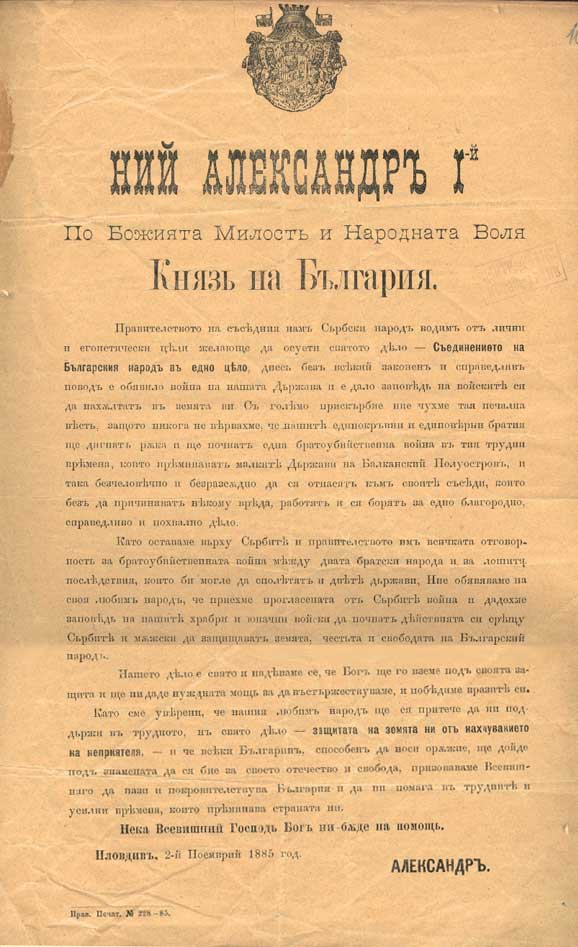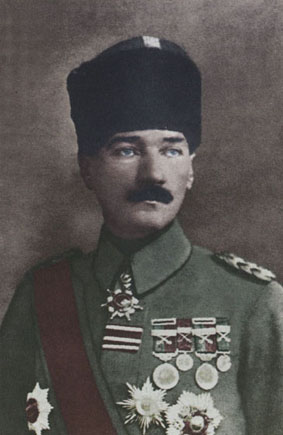|
Nazım Pasha
Hüseyin Nazım Pasha ( tr, Hüseyin Nâzım Paşa; 1848 – 23 January 1913) was an Ottoman general, who was the Chief of Staff of the Ottoman Army during the First Balkan War of 1912–13. He was murdered by Yakub Cemil during the 1913 Ottoman coup d'état. Career He was a staunch supporter of the French Offensive Doctrine, developed primarily by Ferdinand Foch, his instructor at the Saint-Cyr Military Academy and later supreme commander of Allied forces on the Western Front of World War I. Following his appointment as a Chief of Staff, he made immediate changes to Ottoman military doctrine which had been created by Colmar Freiherr von der Goltz (Goltz Pasha), the German officer who had been in charge of the reorganisation and training of the Ottoman Army. Goltz Pasha's doctrine dictated that, in case of war with Balkan states, Ottoman forces would remain on the defensive, both on the western (Vardar) and eastern (Thracian) approaches. Nazım Pasha abandoned Goltz Pasha ... [...More Info...] [...Related Items...] OR: [Wikipedia] [Google] [Baidu] |
Pasha
Pasha, Pacha or Paşa ( ota, پاشا; tr, paşa; sq, Pashë; ar, باشا), in older works sometimes anglicized as bashaw, was a higher rank in the Ottoman political and military system, typically granted to governors, generals, dignitaries, and others. As an honorary title, ''Pasha'', in one of its various ranks, is similar to a British peerage or knighthood, and was also one of the highest titles in the 20th-century Kingdom of Egypt. The title was also used in Morocco in the 20th century, where it denoted a regional official or governor of a district. Etymology The English word "pasha" comes from Turkish ('; also ()). The Oxford Dictionaries attributes the origin of the English borrowing to the mid-17th century. The etymology of the Turkish word itself has been a matter of debate. Contrary to titles like emir (''amīr'') and bey (''beg''), which were established in usage much earlier, the title ''pasha'' came into Ottoman usage right after the reign of the O ... [...More Info...] [...Related Items...] OR: [Wikipedia] [Google] [Baidu] |
Serbo-Bulgarian War
The Serbo-Bulgarian War or the Serbian–Bulgarian War ( bg, Сръбско-българска война, ''Srăbsko-bălgarska voyna'', sr, Српско-бугарски рат, ''Srpsko-bugarski rat'') was a war between the Kingdom of Serbia and Principality of Bulgaria that erupted on and lasted until . Despite Bulgaria being a vassal state of the Ottoman Empire, the Turks did not intervene in the war. Serbia took the initiative in starting the war but was decisively defeated. Austria demanded Bulgaria stop its invasion, and a truce resulted. Final peace was signed on in Bucharest. The old boundaries were not changed. As a result of the war, European powers acknowledged the act of Unification of Bulgaria which happened on . Background On , Bulgaria and the semi-autonomous Ottoman province of Eastern Rumelia declared their unification in the city of Plovdiv. Eastern Rumelia, whose population was predominantly ethnic Bulgarian, had been an artificial creation of the ... [...More Info...] [...Related Items...] OR: [Wikipedia] [Google] [Baidu] |
Government Ministers Of The Ottoman Empire
A government is the system or group of people governing an organized community, generally a state. In the case of its broad associative definition, government normally consists of legislature, executive, and judiciary. Government is a means by which organizational policies are enforced, as well as a mechanism for determining policy. In many countries, the government has a kind of constitution, a statement of its governing principles and philosophy. While all types of organizations have governance, the term ''government'' is often used more specifically to refer to the approximately 200 independent national governments and subsidiary organizations. The major types of political systems in the modern era are democracies, monarchies, and authoritarian and totalitarian regimes. Historically prevalent forms of government include monarchy, aristocracy, timocracy, oligarchy, democracy, theocracy, and tyranny. These forms are not always mutually exclusive, and ... [...More Info...] [...Related Items...] OR: [Wikipedia] [Google] [Baidu] |
Ottoman Military Personnel Of The Balkan Wars
Ottoman is the Turkish spelling of the Arabic masculine given name Uthman ( ar, عُثْمان, ‘uthmān). It may refer to: Governments and dynasties * Ottoman Caliphate, an Islamic caliphate from 1517 to 1924 * Ottoman Empire, in existence from 1299 to 1922 ** Ottoman dynasty, ruling family of the Ottoman Empire *** Osmanoğlu family, modern members of the family * Ottoman architecture Ethnicities and languages * Ottoman Armenians, the Armenian ethnic group in the Ottoman Empire * Ottoman Greeks, the Greek ethnic group in the Ottoman Empire * Ottoman Serbs, the Serbian ethnic group in the Ottoman Empire * Ottoman Turks, the Turkic ethnic group in the Ottoman Empire ** Ottoman Turkish alphabet ** Ottoman Turkish language, the variety of the Turkish language that was used in the Ottoman Empire Products * Ottoman bed, a type of storage bed * Ottoman (furniture), padded stool or footstool * Ottoman (textile), fabric with a pronounced ribbed or corded effect, often made of silk or ... [...More Info...] [...Related Items...] OR: [Wikipedia] [Google] [Baidu] |
Pashas
Pasha, Pacha or Paşa ( ota, پاشا; tr, paşa; sq, Pashë; ar, باشا), in older works sometimes anglicized as bashaw, was a higher rank in the Ottoman political and military system, typically granted to governors, generals, dignitaries, and others. As an honorary title, ''Pasha'', in one of its various ranks, is similar to a British peerage or knighthood, and was also one of the highest titles in the 20th-century Kingdom of Egypt. The title was also used in Morocco in the 20th century, where it denoted a regional official or governor of a district. Etymology The English word "pasha" comes from Turkish ('; also ()). The Oxford Dictionaries attributes the origin of the English borrowing to the mid-17th century. The etymology of the Turkish word itself has been a matter of debate. Contrary to titles like emir (''amīr'') and bey (''beg''), which were established in usage much earlier, the title ''pasha'' came into Ottoman usage right after the reign of the Osman ... [...More Info...] [...Related Items...] OR: [Wikipedia] [Google] [Baidu] |
Ottoman Army Generals
Ottoman is the Turkish spelling of the Arabic masculine given name Uthman ( ar, عُثْمان, ‘uthmān). It may refer to: Governments and dynasties * Ottoman Caliphate, an Islamic caliphate from 1517 to 1924 * Ottoman Empire, in existence from 1299 to 1922 ** Ottoman dynasty, ruling family of the Ottoman Empire *** Osmanoğlu family, modern members of the family * Ottoman architecture Ethnicities and languages * Ottoman Armenians, the Armenian ethnic group in the Ottoman Empire * Ottoman Greeks, the Greek ethnic group in the Ottoman Empire * Ottoman Serbs, the Serbian ethnic group in the Ottoman Empire * Ottoman Turks, the Turkic ethnic group in the Ottoman Empire ** Ottoman Turkish alphabet ** Ottoman Turkish language, the variety of the Turkish language that was used in the Ottoman Empire Products * Ottoman bed, a type of storage bed * Ottoman (furniture), padded stool or footstool * Ottoman (textile), fabric with a pronounced ribbed or corded effect, often made of silk or ... [...More Info...] [...Related Items...] OR: [Wikipedia] [Google] [Baidu] |
1913 Deaths
Events January * January 5 – First Balkan War: Battle of Lemnos (1913), Battle of Lemnos – Greek admiral Pavlos Kountouriotis forces the Turkish fleet to retreat to its base within the Dardanelles, from which it will not venture for the rest of the war. * January 13 – Edward Carson founds the (first) Ulster Volunteers, Ulster Volunteer Force, by unifying several existing Ulster loyalism, loyalist militias to resist home rule for Ireland. * January 23 – 1913 Ottoman coup d'état: Ismail Enver comes to power. * January – Stalin (whose first article using this name is published this month) travels to Vienna to carry out research. Until he leaves on February 16 the city is home simultaneously to him, Hitler, Trotsky and Josip Broz Tito, Tito alongside Alban Berg, Berg, Freud and Jung and Ludwig Wittgenstein, Ludwig and Paul Wittgenstein. February * February 1 – New York City's Grand Central Terminal, having been rebuilt, reopens as the ... [...More Info...] [...Related Items...] OR: [Wikipedia] [Google] [Baidu] |
Le Petit Journal (newspaper)
''Le Petit Journal'' was a conservative daily Parisian newspaper founded by Moïse Polydore Millaud; published from 1863 to 1944. Together with ''Le Petit Parisien'', ''Le Matin (France), Le Matin'', and ''Le Journal'', it was one of the four major French dailies. In 1890, during the Boulangiste crisis, its circulation first reached one million copies. Five years later, it had a circulation of two million copies, making it the world's largest newspaper.Ivan Chupin, Nicolas Hubé and Nicolas Kaciaf, ''Histoire politique et économique des médias en France'', La Découverte, 2009 History Early years The first issue of the Journal appeared on 1 February 1863 with a printing of 83,000 copies. Its founder, Millaud, was originally from Bordeaux and had begun as a publisher of financial and legal newsletters. For a few years, he was the owner of ''La Presse (France), La Presse'', an early Penny press, penny paper. The first printing ran to 83,000 copies; a large printing compared to ... [...More Info...] [...Related Items...] OR: [Wikipedia] [Google] [Baidu] |
Mahmud Shevket Pasha
Mahmud Shevket Pasha ( ota, محمود شوكت پاشا, 1856 – 11 June 1913)David Kenneth Fieldhouse: ''Western imperialism in the Middle East 1914-1958''. Oxford University Press, 2006 p.17 was an Ottoman generalissimo and statesman, who was an important political figure during the Second Constitutional Era. During the 31 March Incident, Shevket Pasha and the Committee of Union and Progress overthrew Abdul Hamid II after an anti-Constitutionalist uprising in Constantinople (modern Istanbul). He played the role of a power broker after the crisis, balancing the various factions of the Young Turks and the army. As War Minister he played a leading role in military reform and the establishment of the Ottoman Air Force. Shevket Pasha became Grand Vizier during the First Balkan War in the aftermath of the 1913 coup d'état, from 23 January 1913 until his death by assassination. Early life and career Mahmud Shevket was born in Baghdad in 1856. His grandfather, Hacı Talib A ... [...More Info...] [...Related Items...] OR: [Wikipedia] [Google] [Baidu] |
Committee Of Union And Progress
The Committee of Union and Progress (CUP) ( ota, اتحاد و ترقى جمعيتی, translit=İttihad ve Terakki Cemiyeti, script=Arab), later the Union and Progress Party ( ota, اتحاد و ترقى فرقهسی, translit=İttihad ve Terakki Fırkası, script=Arab), was a secret revolutionary organization and political party active between 1889 and 1926 in the Ottoman Empire and the Republic of Turkey. The foremost faction within the Young Turk movement, it instigated the 1908 Young Turk Revolution, which ended absolute monarchy and began the Second Constitutional Era. From 1913 to 1918, the CUP ruled the empire as a one-party state and committed genocides against the Armenian, Greek, and Assyrian peoples as part of a broader policy of ethnic erasure during the late Ottoman period. The CUP was associated with the wider Young Turk movement, and its members have often been referred to as Young Turks, although the movement produced other political parties as well. With ... [...More Info...] [...Related Items...] OR: [Wikipedia] [Google] [Baidu] |






